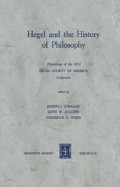Abstract
One of the problems to be faced by anyone seeking to understand and to evaluate Hegel’s treatment of other philosophers is that he never seems to regard their thought as having any tenure beyond the framework of his own philosophical account of the history of philosophy.1 All philosophical standpoints and systems are understood by him in terms of his own comprehensive philosophy of spirit. To a large extent, of course, every philosopher proceeds in this way; how else are we to interpret and assess a given position except in terms established by our own view of what is real and what is true? But in Hegel’s case which is, admittedly, extraordinary because of his having made history decisive for philosophy, one feels both the presence and the force of his philosophical vision to a peculiar degree at just those points where he considers the thought of others. His treatment of Kant is no exception, and, in fact, he sees Kant as most penetrating in his understanding at precisely those points where he most nearly approximates Hegel’s own position. For example, according to Hegel, the singular merit of Kant’s Critique of Judgment is that in his treatment of the Ideas of nature and freedom, he approached genuinely “speculative” thought, in contrast to criticism, and at the same time caught a glimpse of the Idea as a self-determining reality. Or again, he claims that Kant was, in his treatment of the categories, closest of the truth when he grasped their interrelationship and attributed their triadic arrangement to the fact that the third category result from the application of the first category to the second, which, if we take the unity, plurality, totality triad as an example, means that as we proceed in the analysis of something from unity to plurality, we must understand its totality as the unity of the plurality which resulted.
This paper appeared earlier in The Review of Metaphysics, Vol. XXVI, No. 3 (March 1973), and is reprinted here with permission of the editor.
Access this chapter
Tax calculation will be finalised at checkout
Purchases are for personal use only
Preview
Unable to display preview. Download preview PDF.
References
Findlay, Hegel, A RE-examination (London, 1958), p.202.
Author information
Authors and Affiliations
Editor information
Rights and permissions
Copyright information
© 1974 Martinus Nijhoff, The Hague, Netherlands
About this chapter
Cite this chapter
Smith, J.E. (1974). Hegel’s Critique of Kant. In: O’Malley, J.J., Algozin, K.W., Weiss, F.G. (eds) Hegel and the History of Philosophy. Springer, Dordrecht. https://doi.org/10.1007/978-94-010-1657-5_8
Download citation
DOI: https://doi.org/10.1007/978-94-010-1657-5_8
Publisher Name: Springer, Dordrecht
Print ISBN: 978-90-247-1712-5
Online ISBN: 978-94-010-1657-5
eBook Packages: Springer Book Archive

